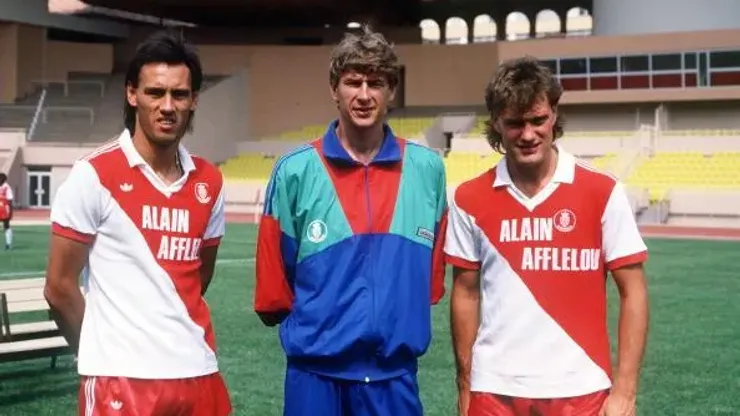There may have been a few less grey hairs, the glasses a little less stylish and even the odd crafty cigarette when Arsene Wenger sat in the Monaco dugout, but the desire to win of the young coach burned just as fierce.
Wenger was in his late 30s when he took over at Monaco, and had a point to prove after being unable to stop Nancy from being relegated in 1987.
Much like when the famous "Arsene Who?" greeted the arrival of an unheralded French coach at Highbury several years later, his appointment was not met by universal approval.
The University of Strasbourg economics graduate, though, quickly began to show profit from his methods, which were then very much revolutionary, both off and on the pitch.
Tottenham midfielder Glenn Hoddle arrived on a free transfer, along with defender Patrick Battiston, who was out of contract at Bordeaux and striker Mark Hateley from Milan.
The 1987/88 Ligue 1 title swiftly followed, as did the arrival of Liberian striker George Weah the following season, with Monaco reaching the Coupe de France final, but were beaten by league champions Marseille, who would later become embroiled in a match-fixing scandal under owner Bernard Tapie to which this day sits uneasy with Wenger.
He recalled: "It was the most difficult period of my life. When you're in a job like mine, you worry about every detail, but then to go to work and know that it is all useless, is a disaster."
Despite such unequal competition, Wenger's Monaco beat Marseille to win the 1991 French Cup and went on to reach the European Cup Winners' Cup final of 1992, but were defeated by Werder Bremen.
German striker Jurgen Klinsmann was now another Wenger convert as Monaco progressed through to the semi-finals of the 1993/1994 Champions League, and his work drew the attentions of German giants Bayern Munich.
That, though, was the highpoint of Wenger's reign, as following a disappointing start to the 1994-95 campaign which saw Monaco down in 17th, he was dismissed.
While Wenger accepts he will never know what more he really could have achieved, Monaco will always hold a special place in his heart.
"I have great memories from my time there. They gave me a chance when I was a very young manager," he said.
"When I arrived they had never passed the first round in the European Cup; we had good times."
Perhaps much like at Arsenal, where Wenger was installed at the end of September 1996 after a spell away from Europe with Nagoya Grampus Eight in Japan, the legacy of his football philosophy will best be remembered by those who were enshrined within it, as Hoddle recalls.
"It was enthralling playing for him, I enjoyed every single second," he said.
"Arsene introduced so many new things to me, his training methods, the warm ups and the warm downs. In all my years at Tottenham, we had never done a warm down.
"We had vitamin injections, all legal of course, all the thinking was way ahead. The physio, Michel Franco, opened my eyes to so many things, he really was a miracle worker.
"Years later, I know Spurs fans don't like it, but when I was England manager, [Arsenal vice-chairman] David Dein asked me about Arsene, and I just said, 'go and get him. He will be successful".
And the rest, as they say, is history.
200+ Channels With Sports & News
- Starting price: $33/mo. for fubo Latino Package
- Watch Premier League, Women’s World Cup, Euro 2024 & Gold Cup
The New Home of MLS
- Price: $14.99/mo. for MLS Season Pass
- Watch every MLS game including playoffs & Leagues Cup
Many Sports & ESPN Originals
- Price: $10.99/mo. (or get ESPN+, Hulu & Disney+ for $14.99/mo.)
- Features Bundesliga, LaLiga, Championship, & FA Cup
2,000+ soccer games per year
- Price: $5.99/mo
- Features Champions League, Serie A, Europa League & Brasileirāo
175 Premier League Games & PL TV
- Starting price: $5.99/mo. for Peacock Premium
- Watch 175 exclusive EPL games per season






